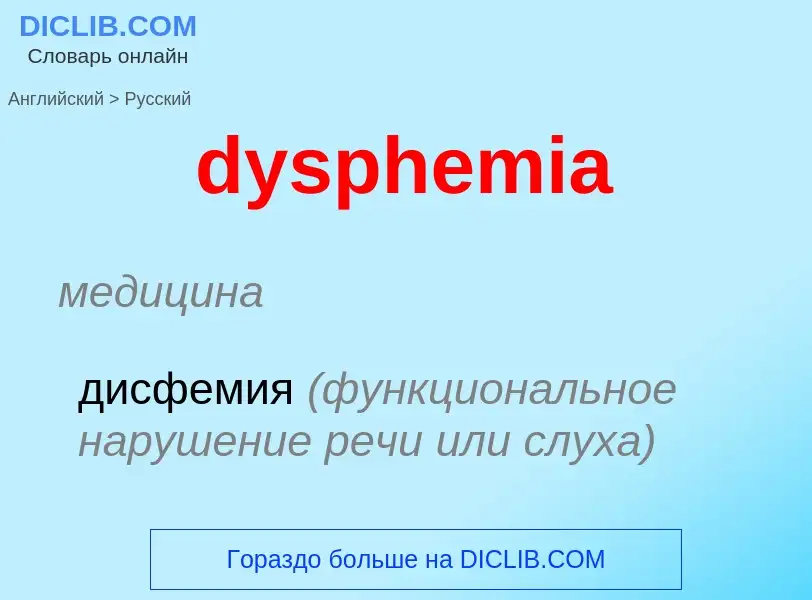Traducción y análisis de palabras por inteligencia artificial
En esta página puede obtener un análisis detallado de una palabra o frase, producido utilizando la mejor tecnología de inteligencia artificial hasta la fecha:
- cómo se usa la palabra
- frecuencia de uso
- se utiliza con más frecuencia en el habla oral o escrita
- opciones de traducción
- ejemplos de uso (varias frases con traducción)
- etimología
dysphemia - traducción al ruso
медицина
дисфемия (функциональное нарушение речи или слуха)
['stʌt(ə)rə]
разговорное выражение
заика
существительное
общая лексика
заика
военное дело
пулемёт
Wikipedia
Stuttering, also known as stammering, is a speech disorder in which the flow of speech is disrupted by involuntary repetitions and prolongations of sounds, syllables, words, or phrases as well as involuntary silent pauses or blocks in which the person who stutters is unable to produce sounds. The term stuttering is most commonly associated with involuntary sound repetition, but it also encompasses the abnormal hesitation or pausing before speech, referred to by people who stutter as blocks, and the prolongation of certain sounds, usually vowels or semivowels. According to Watkins et al., stuttering is a disorder of "selection, initiation, and execution of motor sequences necessary for fluent speech production". For many people who stutter, repetition is the main concern. The term "stuttering" covers a wide range of severity, from barely perceptible impediments that are largely cosmetic to severe symptoms that effectively prevent oral communication. Almost 70 million people worldwide stutter, about 1% of the world's population.
The impact of stuttering on a person's functioning and emotional state can be severe. This may include fears of having to enunciate specific vowels or consonants, fears of being caught stuttering in social situations, self-imposed isolation, anxiety, stress, shame, low self-esteem, being a possible target of bullying (especially in children), having to use word substitution and rearrange words in a sentence to hide stuttering, or a feeling of "loss of control" during speech. Stuttering is sometimes popularly seen as a symptom of anxiety, but there is no direct correlation in that direction.
Stuttering is generally not a problem with the physical production of speech sounds or putting thoughts into words. Acute nervousness and stress are not thought to cause stuttering, but they can trigger stuttering in people who have the speech disorder, and living with a stigmatized disability can result in anxiety and high allostatic stress load (chronic nervousness and stress) that increase the amount of acute stress necessary to trigger stuttering in any given person who stutters, worsening the situation in the manner of a positive feedback system; the name 'stuttered speech syndrome' has been proposed for this condition. Neither acute nor chronic stress, however, itself creates any predisposition to stuttering.
The disorder is also variable, which means that in certain situations, such as talking on the telephone or in a large group, the stuttering might be more severe or less, depending on whether or not the person who stutters is self-conscious about their stuttering. People who stutter often find that their stuttering fluctuates and that they have "good" days, "bad" days and "stutter-free" days. The times in which their stuttering fluctuates can be random. Although the exact etiology, or cause, of stuttering is unknown, both genetics and neurophysiology are thought to contribute. There are many treatments and speech therapy techniques available that may help decrease speech disfluency in some people who stutter to the point where an untrained ear cannot identify a problem; however, there is essentially no cure for the disorder at present. The severity of the person's stuttering would correspond to the amount of speech therapy needed to decrease disfluency. For severe stuttering, long-term therapy and hard work is required to decrease disfluency.

![[[Lewis Carroll]], the well-known author of'' [[Alice's Adventures in Wonderland]]'', had a stammer, as did his siblings. [[Lewis Carroll]], the well-known author of'' [[Alice's Adventures in Wonderland]]'', had a stammer, as did his siblings.](https://commons.wikimedia.org/wiki/Special:FilePath/LewisCarrollSelfPhoto.jpg?width=200)
![Notker Balbulus]], from a medieval manuscript. Notker Balbulus]], from a medieval manuscript.](https://commons.wikimedia.org/wiki/Special:FilePath/Notker Balbulus 2.jpg?width=200)

